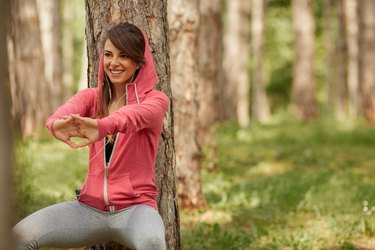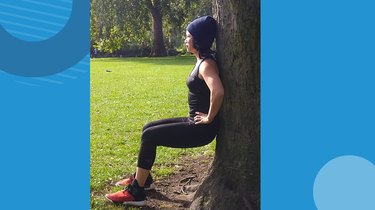
Who says you need a weight room to get a proper workout? Make nature your gym with this 20-minute, body-weight workout, which uses a tree. A tree is not only as sturdy as a wall to do squats, push-ups and elevated mountain climbers, but its uneven surface also tests your core stability and balance.
It also serves as a great assist for movements you want to perfect. For example, when you're doing a push-up against a tree, you're more likely to bring your chest to touch the trunk, helping you practice full range of motion. If you're doing a squat, you'll be able to bring your thighs to parallel and feel it more in your quads versus your glutes.
Video of the Day
So the next time you're going for a walk or hike, consider squeezing in this 20-minute workout. You'll catch some fresh air, avoid wasting time in traffic and safeguard your health from indoor gym germs.
Check out more of our 20-minute workouts here — we've got something for everyone.
Move 1: Static Sit-Squat

Stand with your back pressed against a tree and your hands on your hips. Squat down until your thighs are parallel to the ground.
Make sure your feet are shoulder-width apart, toes facing forward.
Hold this position for 20 to 25 seconds before pressing your heels firmly on the ground to stand back up.
Move 2: Close Hand Push-Ups
Face the tree with your feet together and your toes about 4 feet away from the tree.
With your arms straight, place your hands together on the tree with your fingers pointing upward at shoulder height.
Bending at the elbows, slowly lower yourself toward the tree, stopping short of your face touching your hands.
Hold for one count before straightening your arms back to the starting position.
Move 3: Crunch
- Lie face-up on the ground with your knees bent at 90 degrees and feet up against the tree. Rest your head gently in your palms with your hands clasped.
- Inhale, and on the exhale, slowly curl your upper body toward your knees.
- Your shoulders and upper back should come off the ground. Make sure your mid and lower back stay firmly on the ground.
- Hold for one count while tensing your abdominals, then inhale and slowly lower your body back to the starting position.
Move 4: Single-Leg Lunge
- Stand in front of the tree with your back facing it and feet shoulder-width apart. Place your hands on your hips.
- Take a big step forward with one leg and place the other leg behind you with your foot flat on the tree.
- Slowly lower your body until your front thigh is parallel to the ground, or as low as you can comfortably go.
- Hold for one count before pressing your front heel into the ground to straighten your leg and return to the starting position. Do 12 to 15 repetitions on one leg before switching to the opposite leg.
Move 5: Upside Down Mountain Climbing
- Standing in front of a tree, place your hands shoulder-width apart on the ground. Make sure your hands are at a comfortable distance away from the tree so that you can extend your legs back onto the tree.
- While balancing on your hands, extend your legs behind you with your feet firmly against the tree. Your legs should be parallel to the ground, back flat and your head and neck aligned with your upper torso.
- From this position, drive one knee toward your chest.
- Hold for one count before returning to the starting position and repeating on the opposite leg.
Tip
This is an advanced exercise that requires a lot of upper-body strength and balance. To modify this exercise, do basic mountain climbers on the ground, focusing on maintaining a strong plank throughout the movement.